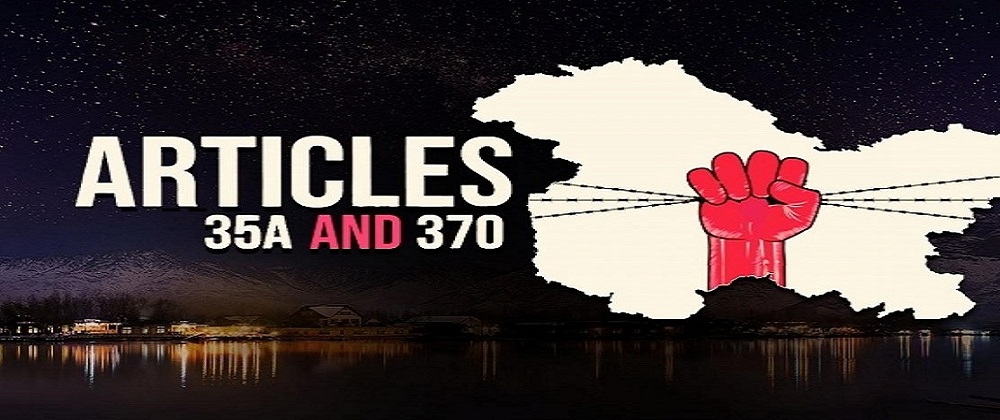On 5th August 2019, President of India in the exercise of the powers conferred by Clause (1) of Article 370 of the Constitution had issued the Constitution (Application to Jammu and Kashmir) Order, 2019. Through this, Government of India has made modifications in Article 370 itself (not revoked it). With this, the Government of India has dramatically changed the relationship between the state of Jammu and Kashmir and the Indian Union.
Background:-
On October 17, 1949, Article 370 was added to the Indian constitution, as a ‘temporary provision’, which exempted Jammu & Kashmir, permitting it to draft its own Constitution and restricting the Indian Parliament’s legislative powers in the state.
o N. Gopalaswami Ayyangar represented India at United Nations Security Council and later drafted the Article 370 of the Indian constitution that granted autonomy to J & K.
o The J&K Constituent Assembly was dissolved after it drafted the state’s constitution. Clause 3 of the article 370 gives the President of India the power to mend its provisions and scope.
Article 35A stems from Article 370 and was introduced through a Presidential Order in 1954, on the recommendation of the J&K Constituent Assembly.
o Article 35A empowered Jammu & Kashmir legislature to define the permanent residents of the state, and provide special rights and privileges to the citizens of J & K. It appears in Appendix I of the Constitution.
Key Changes:-
• The Constitution (Application to Jammu and Kashmir) Order, 2019 has replaced Presidential Order of 1954.
• Subsequently, the Jammu and Kashmir Reorganization Bill, 2019, passed by Parliament divides the state of Jammu and Kashmir into two new Union Territories (UTs): Jammu & Kashmir and Ladakh.
• This is the first time that a state has been converted into a UT.
• Of the six Lok Sabha seats currently with the state of Jammu and Kashmir, five will remain with the union territory of Jammu and Kashmir, while one will be remained with Ladakh.
• The UT of Jammu and Kashmir will have an Assembly, like in Delhi and Puducherry.
• Instead of 29, India will now have 28 states. Kashmir will no longer have a Governor, rather a Lieutenant Governor like in Delhi or Puducherry.
Status of J&K Union Territory
• J&K Assembly will have a five-year term in Assembly, not six, as was the earlier case.
• Section 32 of the J&K 2019 Bill proposes that the Assembly can make laws on any subjects in the State and Concurrent lists except on state subjects relating to “public order” and “police”.
• This is similar to Article 239 A of the Constitution that is applicable to Union Territories of Puducherry and Delhi.
• However, by insertion of Article 239AA and by virtue of the 69th Constitutional Amendment, the Delhi Assembly cannot legislate on matters in entry 18 of the State List, i.e., land.
• The special status provided to J&K under Article 370 will be abolished.
• Jammu & Kashmir will no longer have the separate constitution, flag or anthem.
• Now any citizen of India can purchase land in Kashmir and can live in Kashmir.
• The citizens of Jammu and Kashmir will no longer have dual citizenship.
• The other citizens of States can now become the citizen of J & K.
• As the new union territory of Jammu and Kashmir will be subject to the Indian Constitution, its citizens will now have the Fundamental Rights enshrined in the Indian constitution.
• Article 360, which can be used to declare a Financial Emergency, will now also be applicable.
• All laws passed by Parliament will be applicable in Jammu and Kashmir, including the Right to Information Act and the Right to Education Act.
• The Indian Penal Code will replace the Ranbir Penal Code of Jammu and Kashmir.
• Article 35A, which originates from the provisions of Article 370 now become null and void.
• Since Presidential Order has extended all provisions of the Constitution to Jammu and Kashmir, including the chapter on Fundamental Rights, the discriminatory provisions under Article 35A will now be unconstitutional.
• Another discriminatory legal provision, which prevented women in J & K from retaining their rights if they married outside the state, has been put to an end.
Challenges:-
1. Constitutional challenges-
As per article 370 (3), the President would require the recommendation of the constituent assembly of Jammu and Kashmir to abrogate Jammu and Kashmir’s special status. As per the critics, government is trying to curb the autonomy by removing Article 370 without bringing a Constitutional Amendment that would require a two-thirds majority in the Parliament.
2. Federalism issue:-
The Instrument of Accession was like a treaty between two sovereign countries that had decided to work together.
3. Rise in Militancy:-
Article 370 was seen by Kashmiris as a marker of their separate identity and autonomy.
Removal could lead to severe repercussions like there could be some possibility of violence & riots . Anti-social elements in Pakistan would find Kashmir to be the most vulnerable ground for breeding terrorism.
Blog By:-
Ms. Nitika Kewlani
Assistant Professor
Department of Commerce & Management
Biyani Group of Colleges

